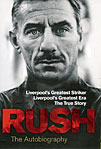 The Autobiography
The Autobiography
by Ian Rush
Ebury, £18.99
Reviewed by Robert Fordham
From WSC 263 January 2009
“It’s funny,” Ian Rush says at one point, “how often seemingly inconsequential things seem to stick in your mind for years to come.” As his autobiography ploughs through lists of opponents for pre-season friendlies, “funny” is not the word that comes to mind. Likewise, the dressing-room jokes Rush recalls are often less side-splitting than he supposes. An attempt to dress him up as a “rough-edged youth” made good, off the back of one bungled shoplifting attempt, falls flat.
So there is no danger of mistaking Rush for “a character” – but by the end of the book you are left with the feeling that a fundamentally decent individual is perhaps unfairly dismissed because, in a media-dominated age, he has always been as shy in front of a microphone as he was deadly in front of goal. The Liverpool legend lays to rest the biggest myth about him, the claim that he said, “Playing in Italy was like playing in a foreign country”, or anything like it. On Thursday August 18, 1988, a reporter looking for the inside track on Rush’s return from Juventus cornered the manager and fell, taking the rest of us with him, for one of Kenny Dalglish’s dead-pan one-liners.
That he and Dalglish remain close comes as no surprise, unlike his friendship with Michel Platini, dating from a Wales victory over France on the eve of the 1982 World Cup. A month later the two are on the phone the day after France’s agonising shootout defeat to West Germany. Platini tells the story of Icarus, then explains the moral – it’s not “Don’t fly too close to the sun”, but “Build better wings”. There are few signs of such bons mots from Rush, but he does appreciate those of others; there’s a detail from the leaving party of another modest man, Bob Paisley: “I told him I knew I still had a lot to learn about football. ‘So have I,’ he said.”
The memory for detail serves him well through Rome, Heysel and Hillsborough. Rush is unfailingly polite – even thanking the chairman who eventually undermined him at Chester and thereby forced his resignation, for giving him a break in management. This mildest of axe-grinders only names his friends at Juve, rather than those whose commitment he and Platini questioned. It’s a rare generosity in an age when putting the boot in is right up there with making money as a reason for penning an autobiography.
Rush should have a quiet word with his ghostwriter and editors. He comes up against “Nigel Spinx” and “Alan Night”, aided by “Stevie Nichol”, while Mark Wright breaks a leg early in a 1986 FA Cup semi-final, only for Dalglish in extra time to play “yet another wonderfully timed pass behind the Southampton backline. I left Mark Wright to his own devices.” I’d have fancied my chances of beating Wright to that ball.
This is no page-turner and it succeeds far more as the story of “Liverpool’s greatest era”, as the cover puts it, than at selling its author. “Liverpool’s greatest striker” wants another crack at management, but the personality on show seems more suited to coaching than to the hard decisions. However, there’s a warmth to this book that is more than just the glow of nostalgia: gratitude, decency and optimism shine through to the end, even if it’s hard work getting there.